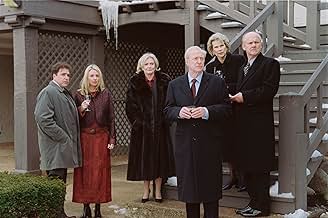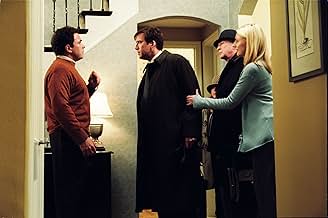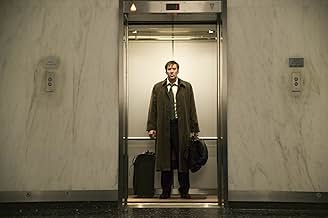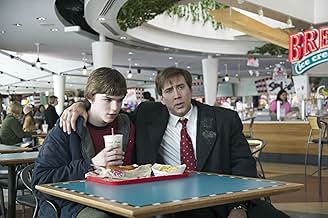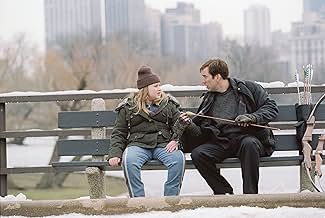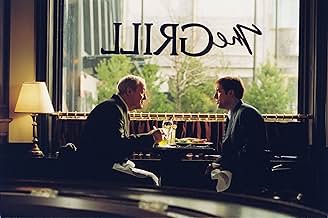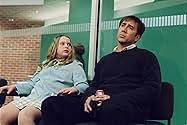The Weather Man
- 2005
- Tous publics
- 1h 42min
Un présentateur météo de Chicago, séparé de sa femme et de ses enfants, se demande si la réussite professionnelle et la réussite personnelle sont inconciliables.Un présentateur météo de Chicago, séparé de sa femme et de ses enfants, se demande si la réussite professionnelle et la réussite personnelle sont inconciliables.Un présentateur météo de Chicago, séparé de sa femme et de ses enfants, se demande si la réussite professionnelle et la réussite personnelle sont inconciliables.
- Shelly
- (as Gemmenne De La Peña)
- Clerk
- (as Deanna NJ Brooks)
- Nurse
- (as Sia Moody)
- Fast Food Employee
- (as Alejandro Pina)
Avis à la une
Nicolas Cage takes the lead role, and while he's never really stretched; he manages to give a fine performance throughout the film. In support, we've got the likes of Michael Caine and Hope Davis, as well as talented youngster Gemmenne de la Peña, who all round the acting off nicely. The film manages to pull together two very different tones and make it work. There's some rather funny humour on display, and this is mixed with an overall pessimistic mindset. This gives The Weather Man something of an original standpoint, and although it has to be said that the plot itself is never overly interesting, the tone of the movie is good enough to see it through. From mainstream cinema; especially American mainstream cinema, you don't expect to see films with such a depressing viewpoint on life - but it really doesn't get much more depressing than the one professed here. Verbinski's film states that, like the weather, life cannot be predicted - and no matter what hopes and dreams you have, they're likely to be smashed by the time it comes to realising them. Ouch.
This movie was not at all like I was expecting. The Weather Man is crass and silly, but it's also extremely dark and sad. David Spritz is a sad, lonely man who's trying to reconcile with this ex-wife and get his family back together, but despite his best intentions, things just never work out the way he wants. More than anything, he wants to prove to his dying father that he can be a great man too, but time is running out. This is not your typical comedy. It's not easy to watch sometimes, but according to Robert Spritz, "Easy doesn't enter into grown-up life."
Nicolas Cage, who I don't always like, gives a fantastic performance as David Spritz, a Chicago TV weather man with no degree in meteorology. The thing that makes him great in The Weather Man is that he consistently plays the part in earnest. There's plenty of opportunities to ham it up or play it for laughs, especially because David acts like such an asshole so much of the time, but Cage never falls into those traps. One feels at every turn, no matter how disgraceful his behavior, that he's just a guy trying to do what seems right to him in that moment. At one point he drops his daughter off at his ex-wife's house. When his ex-wife, played with terrific subtly by Hope Davis, remains outside for a moment he suddenly decides to throw a snowball at her, which hits her in the face and cracks the lens of her glasses. Rather than playing it like it's funny, which it is, Cage seems like he's making a sincere attempt to connect with his former wife in any way he can.
I wish with great passion that this film was truly great, but unfortunately it's just inches short. Nine out of ten times Verbinski hits the mark. From the very first shot he creates a perfectly executed world of an ice bound Chicago during the winter months. His most impressive feat though is managing to craft a film that is in some ways highly stylized, yet instinctually feels like the human experience. He has a wonderful and surprising sense of composition. One finds the characters in disconcertingly angular frames with vast expanses of empty space above their heads. In tandem with this he uses a fantastically chilly color scheme throughout. He also triumphs in his insistently measured pacing. In contrast with such a harsh statement about life, the pacing serves to lend the film a strange gentleness that allows for us to feel the characters are truly human. The pacing is absolutely vital and absolutely brave in a Hollywood film. Along with the performances, it makes one feel that the characters are being not being tortured out of gleeful spite on the part of the filmmakers, but out of profound empathy and understanding of our shared human weaknesses.
Verbinski's trouble comes in just a few isolated areas; nevertheless they are important and significantly damage the film as a whole. The ugliest problem is a woefully ill-advised quasi dream sequence in which Nicholas Cage sees himself happy and well adjusted as the grand marshal of a parade. The whole thing is presented as if his hotel room window is like a TV on which he is seeing himself. It introduces us to no useful ideas and is an immensely distracting stylistic departure. I'm really puzzled by its inclusion in a movie that on the whole demonstrates a lot of restraint. Another issue is the handling of Cage's son, who gets himself involved in a weird molestation situation with his drug counselor. This subplot is painted in the broadest of strokes, rather than with the painstaking specificity one finds elsewhere. Every time we return to the plot with the son the film begins to feel bogged down and uncharacteristically unsure of itself. Some of the blame for this surely must be shared with Steve Conrad, the mostly solid writer of the film. One wonders why Conrad and Verbinski shy away from the unbending frankness they are generally so willing to dole out. There are a few other troubling mistakes, the blame for which I have to rest on both of their shoulders. Most notably the film relies too heavily on voice-over. While some of it works very well and all of it is delivered with sincerity from Cage, there is at least twice as much as is necessary. Similarly, there are a couple flashbacks that work, but just as many that are unneeded. Also, the handling of Cage's father, who is played with solemn dignity by Michael Cane, rings a little false. He is written as a noble and stalwart man devoid of any flaws not only in Cage's mind, but apparently in real life as well. On the whole this actually works much better than it should, but I can't help but feel that there's a note missing.
The aforementioned issues aside, The Weather Man is a rare achievement and one of my favorite films of the year. It is so honest and so bleak that I can't believe that a major studio let it get made. In an industry where schlock and melodrama are passed off as great statements about us as humans The Weather Man is monumentally refreshing. I have nothing but respect for Verbinski and Conrad for having the nerve to make a film that on the one hand is crushingly negative, but on the other endlessly humane.
"The Weather Man" is a weird and pessimist view of the contemporary American Way of Life. The complex and contradictory lead character is capable of making lots of money just because he can perfectly sell his image to the public without having knowledge about what he is talking; inclusive he is frustrated, feels shallow and compares himself to a fast-food. But he is unsuccessful to have the right attitudes with his family in spite of his best efforts and needy to prove his father his own merits. However, the story is pointless and boring in some moments and in the end I found this movie only reasonable, but with a great potential not well explored by the director. My vote is six.
Title (Brazil): "O Sol de Cada Manhã" ("The Sun of Each Morning")
David Spritz (Nicholas Cage) is a TV pawn the station uses as a weatherman: he is untrained as a meteorologist, skilled only be his TV persona success dependent on a created gag/tag line - the Nipper (the peak worst day in the forecast). His personal life is a mess, separated from a disconsolate wife Noreen (Hope Davis), distanced from his successful writer father Robert (Michael Caine) and on shaky territory with his two children - fat and sad Sully (Gemmenne de la Peña) and sweet but troubled pothead Mike (Nicholas Hoult). To make life worse his TV persona follows him into the streets of blustery Chicago where his viewers either seek autographs invading his privacy or throw food at him as the progenitor of the lousy cold weather. This polarized existence is invaded by an offer to become weatherman on Bryan Gumbel's Hello America show in New York (a career jump for which he longs for many reasons), serial confrontations with his father whom he emulates but always feels a failure, the finding that his father has lymphoma, the ridicule of fat Shelly at school, Mike's edgy involvement with his drug counselor Don (Gil Bellows), and Noreen's new live-in Russ (Michael Rispoli). How David meanders through this quagmire of dilemmas is the story and while it is not pretty, it is pungent.
Cage inhabits the strange role of David finding a way to make this loser with a short temper someone about whom we care. It is a tough assignment but Cage meets it on every level. Michael Caine provides some of the more eloquent moments in the film: his words of wisdom and view of life are the only grounded elements of the story. Likewise Hope Davis is fine as are the cameo roles of the children as sensitively played by de la Peña and Hoult. The subject of the film is tough and the excessive use of potty mouth language is overbearing and at times one wishes Verbinski would have edited some of the gross food slinging scenes.
But as an overall message movie there is much here to admire. It simply is not the mindless slapstick the posters and trailers would indicate. The PR folks on this one blew it. Worth your time and attention. Grady Harp
Le saviez-vous
- AnecdotesThe "plastic" spoon stuck to Nicolas Cage's lapel was actually a metal spoon that had been painted to appear plastic and which was held in place with a magnet.
- GaffesWhen David enters the bathroom and rinses, the mirror reveals that his watch is undone and hanging around his wrist. In the next shot, from a different angle, his watch is done up.
- Citations
Dave Spritz: I remember once imagining what my life would be like, what I'd be like. I pictured having all these qualities, strong positive qualities that people could pick up on from across the room. But as time passed, few ever became any qualities that I actually had. And all the possibilities I faced and the sorts of people I could be, all of them got reduced every year to fewer and fewer. Until finally they got reduced to one, to who I am. And that's who I am, the weather man.
- ConnexionsFeatured in Atmospheric Pressure: The Style and Palette (2006)
- Bandes originalesThe Passenger
(1977)
Written by Iggy Pop & Ricky Gardiner
Performed by Iggy Pop
Courtesy of Virgin Records
Under license from EMI Film & Television Music
Meilleurs choix
- How long is The Weather Man?Alimenté par Alexa
Détails
- Date de sortie
- Pays d’origine
- Langue
- Aussi connu sous le nom de
- El sol de cada mañana
- Lieux de tournage
- Sociétés de production
- Voir plus de crédits d'entreprise sur IMDbPro
Box-office
- Budget
- 22 000 000 $US (estimé)
- Montant brut aux États-Unis et au Canada
- 12 482 775 $US
- Week-end de sortie aux États-Unis et au Canada
- 4 248 465 $US
- 30 oct. 2005
- Montant brut mondial
- 19 126 398 $US
- Durée1 heure 42 minutes
- Couleur
- Mixage
- Rapport de forme
- 1.85 : 1
Contribuer à cette page





